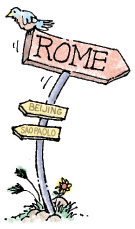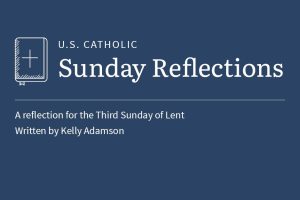The diverse challenges of a struggling world need local solutions from a flexible church.
Among the theologians of the Second Vatican Council, the name of Dutch Dominican priest Edward Schillebeeckx is surely among the most well-known (and least pronounceable). His works on the church and ministry, such as the pithily titled Ministry and the more evocative The Church with a Human Face (both Crossroad), are marked both by their foresight and their pastoral sensitivity.
Though he is now quite elderly, Schillebeeckx's work continues to bear fruit, most recently among his Dutch Dominican brothers, who in the fall published a booklet titled "Church and Ministry," which argues that laypeople should preside at Eucharist if no priest is available. "Whether they are women or men, homo- or heterosexual, married or single, makes no difference. What is important is an infectious attitude of faith." Not surprisingly the U.K. Tablet judged the proposal "a radical recommendation."
But surprising solutions are not arising only in this country known for liberalism. In October 2002 Bishop Fritz Lobinger of Aliwal North, South Africa, with Austrian theologian Paul Zulehner, proposed a new order of ministry for the priest-poor churches of the developing world. In their vision a council of "Corinthian" priests would be ordained for a particular community to see to its sacramental needs and direct its ministry. These groups, made up of proven members of the community, would be supervised by "Pauline" priests, traditional celibates reporting to the bishop.
Though they offer different approaches to the same problem, what makes these ideas great is that they are local solutions created by people on the ground. Both might bring success, each in its own situation.
The problem, however, is that we Catholics are often beset by the attitude that all 1.1 billion of us have to be doing the same thing everywhere. But with so many cultures and countless different pastoral challenges-some of which have nothing to do with ordination-Catholicism fairly demands a variety of approaches to pressing problems. There is no one-size-fits-all solution to the needs of God's people.
The HIV/AIDS pandemic in Africa is one case in point. The massive number of infections, and the efficacy of condoms as part of the strategy to prevent them, is why leaders such as Bishop Kevin Dowling of Rustenburg, South Africa have argued for a change in the church's policy on condoms in relation to HIV. The pastoral reality he faces has little to do with artificial birth control but everything to do with life and death. He's not asking for the church to start distributing condoms throughout the world, just the flexibility in his own situation to meet a particular crisis.
Unfortunately local solutions don't often mesh well with the more "universalist" thinking of some Catholics and some in the Vatican in particular. The bishops of the United States were once leaders in responding to local realities, issuing two influential pastoral letters in the 1980s specific to the U.S. on the economy and peace. The bishops of Latin America did much the same then, producing documents that emphasized the preferential option for the poor.
Pope John Paul II in 1998, however, issued a papal "executive order," Apostolos Suos, that greatly restricted the ability of bishops to make such statements by requiring a practically impossible unanimous vote of a conference's bishops or direct Roman approval, which lately has been hard to get. A planned pastoral letter on women from the U.S. bishops in the early 1990s was effectively tabled, and little new has happened since.
Still, the Catholic Church needs local solutions now more than ever. Almost every local church needs greater access to the sacraments, whether that means commissioning laypeople or rethinking ordination itself. The churches of Asia are struggling with how to be Christian when the majority of their neighbors are not. Catholics in Africa face not only AIDS but war and intractable poverty. European Catholicism is questioning its place in an increasingly secular culture, while the Catholics of the United States must find creative ways to be faithful citizens of the world's only superpower.
To succeed, each church needs freedom and flexibility. Though a limited universalism can go a long way toward maintaining unity of faith, rigid insistence on a single answer to practical challenges doesn't help. As Schillebeeckx and theologians like him have long argued, now is the time to try new things.















Add comment